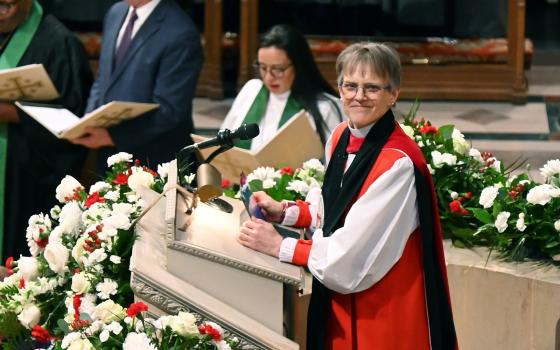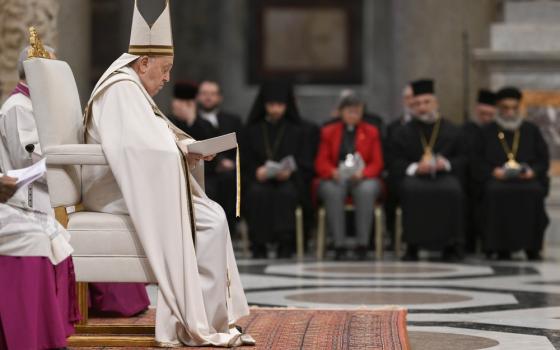A campsite for a 14-member volunteer search and rescue team made up mostly of Jesuit seminarians and priests is seen Dec. 21, 2024, in Arizona's Sonoran Desert, around Growler Valley. The group was looking for missing or dead migrants who crossed the Mexico border into the U.S. (OSV News/courtesy John Millikan, S.J.)
About a dozen Jesuits from all over the world on a search and rescue mission in Arizona's Sonoran Desert Dec. 20-22 came across eight areas that had remains of missing people.
The group, which included three lay volunteers, was in search of migrants who crossed the Mexico border into the United States.
Jaret Ornelas is a Jesuit seminarian and has been a regular volunteer for the past three and a half years with Battalion Search and Rescue, a humanitarian nongovernmental agency based in Ajo, Arizona. It's one of various advocacy groups that do this kind of work, including Aguilas del Desierto and No More Deaths.
Ornelas, 35, said it is very rare to find anyone other than migrants in such remote outskirts of the state. With Battalion, he said, he has helped recover the remains of 30 (identified) people and found eight people alive.
"You don't get used to it," Ornelas told OSV News after finishing the mission Dec. 22. "It's still heartbreaking every time. Usually, how it works for me when I first spot something, a pit will form in my stomach, but then, there's a little shot of adrenaline and you get about doing your work. And it's later, sometimes a couple hours, sometimes a couple days later, that it really hits you."
Ornelas said he was exhausted and still had to process the weekend's search mission. But he described that in the past after finding pieces of a child's skull, he has felt "furious that this world is so broken" but that he was also grateful because he was certain the dead were "with God."
The migrant death mapping organization Humane Borders, partnering with the Pima and Maricopa counties' medical examiners, has so far counted about 4,300 deaths along the Arizona border in a 42-year period through 2023.
The group said that as of 2024, some 1,600 remains are unidentified. And because of the huge, remote, desolate territory, the group has noted that a "substantial percentage of human remains will never be found."
For Ornelas — who expressed gratitude often during his OSV News interview for being able to do this kind of work — the difference in the search and rescue mission this time was that he was able to be with his religious community, whom he invited. The two priests who joined nine seminarians celebrated Mass nightly for the dead.
"After Mass and after dinner, we had faith-sharing every night, just checking in with each other. And I felt so much gratitude for the other companions here," he said. "But at the same time when I heard on the (walkie talkie) radio … a guy… (who) I was big brother to in the novitiate said he found a humerus and his group found a skull, I got choked up because I'm grateful that there are more people who are doing this work, but I also know that these things are going to stay with them. These images, and it's heavy."
Advertisement
Under unusually hot conditions for this time of year, according to Ornelas, the group of all men and one woman, focused their search on a 30-mile stretch of Growler Valley in south-central Arizona. Photos submitted to OSV News by the seminarians who participated included images of single shoes, an old Blackberry phone embedded in the sand and partially blanched human bones. Bright fuchsia-pink ribbons tied atop dried tree branches dotted the landscape marking the spots where they found human remains.
Ornelas explained search teams use GPS to record the exact location of the remains and submit them to local authorities, who, particularly in that area, Pima County, pick them up within 24 hours for forensic examination and identification.
It was an area of "sheer beauty and complete silence" that also brought Jesuit seminarian Joshua Choong of Sydney, Australia, to tears and stirred up feelings of anger.
"There was this part of me as we were doing a search yesterday that wondered, 'What in the world are we — why do we even have to do this? We shouldn't have to do this.' And yet here we are searching for the remains of dead migrants who were forced to flee into the desert," said the 47-year-old transitional deacon finishing his theology degree at Boston College.
The migrants, mostly from Latin American countries but also from as far away as China and countries in Africa, who come to the U.S. illegally seek to escape gang violence, political and economic instability, and disasters, among other reasons. Those who enter on foot are in danger of getting separated from family or companions and dying of the elements.
But Choong told OSV News he was struck and consoled by "the incarnational aspect" of the "heavy" mission, which he called intense.
Choong, who is new to migrant search and rescue work, said, "The fact that we are about to celebrate Christmas, the fact that the Lord is about to be incarnated at Christmas and we sing 'O Come Emmanuel,' it just makes so much more sense. … The Lord is incarnated amongst us. The Lord is incarnated in those migrants who have perished. The Lord is incarnated in this desert. The Lord is incarnated in this, what I call sheer beauty, yet also a graveyard. And the Lord, of course, is incarnated in my brothers."
Jesuit Father Brad Mills of San Diego was one of the priests who celebrated Mass for the deceased whose bones were found one day. On his first ever search and rescue mission, he told OSV News it was "especially meaningful to have said the Mass "in a setting where countless people had lost their lives."
"We were remembering them in some ways," said Mills, 41. "All of them were present in that Mass. And one phrase we kept saying as a group was that 'death does not have the final say.'"
He added it was also a meaningful way to spend the last days of Advent.
"I think when we encounter great suffering and great darkness, we can't help but long for Christ's coming. We can't help but long for more light. I found myself longing for more light in the form of more justice, more humane treatment of immigrants and refugees around the world and longing for a world where immigrants aren't talked about in demonizing terminology, but rather are seen as human beings, and valued," said Mills.






